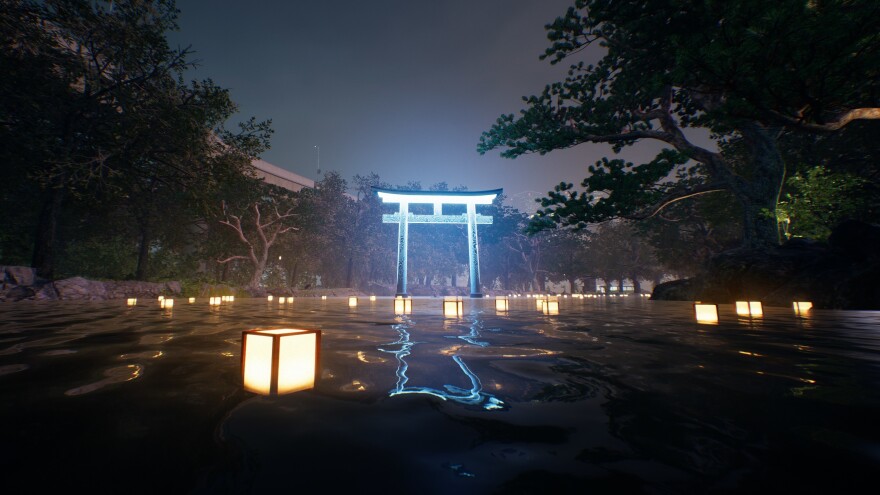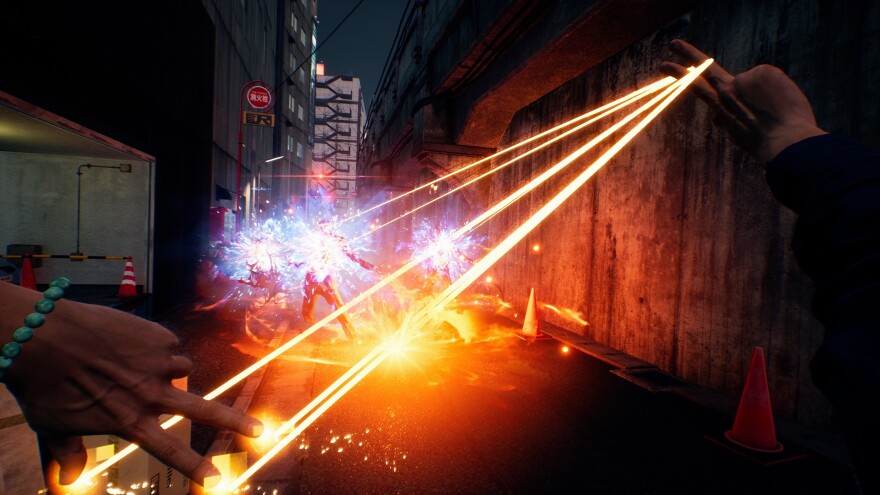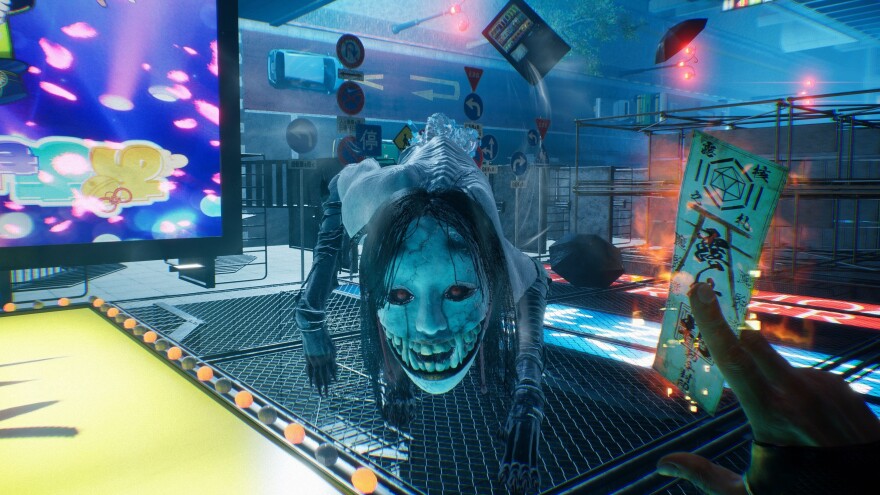Ghostwire: Tokyo is not a horror game, but it sure looks like one. It's brought to us by Tango Gameworks, the studio led by the designer of the first four Resident Evil games, and the recent Evil Within duology. But despite this pedigree, Ghostwire only borrows horror tropes to present a foggy, glitchy Tokyo, replete with action, adventure and puzzles. But if you're looking for real scares, you'll likely be disappointed.
You play as Akito, whose attempt to visit his hospital-bound sister Mari gets interrupted by a nefarious fog (the Corruption) which turns Tokyo into a literal ghost town. When a car accident leaves Akito on death's door, the spirit of a supernatural detective named KK possesses him. But, to KK's chagrin, Akito survives. Sharing a body, KK and Akito come to an accord: Akito agrees to help KK fight the group responsible for the Corruption if KK helps him save his sister, who antagonist Hannya (named for the mask he wears) has whisked away.

Visiting a nightmarish Tokyo
What follows is an open world quest through Tokyo's neon-drenched streets, where Akito and KK battle ghastly "Visitors," Hannya, and his followers. These Visitors aren't ghosts, exactly — rather, they're manifestations of the stress and strife of city dwellers. Those enemies that look like Slenderman? The in-game database calls them Rain Walkers, "born from the hearts of those pushed to the point of utter exhaustion by their work." Those headless school girls that sprint towards you? They're Students of Misery, "born from the anxieties of young female students." These highly specific hauntings, so present in Japanese folklore and horror, set Ghostwire: Tokyo apart. I frequently turned to the game's (thankfully short) entries to learn about everything I came across.
Akito is as vulnerable a protagonist as KK and Hannya are mysterious, as weighed down by regrets as any of the spirits he encounters. And much like KK and Hannya, his story revolves around his response to trauma, and around his relationship to the loved ones that survived alongside him. KK and Hannya all experience similar moments of tragedy, and while none of them responded well, I appreciate how all of them responded differently. Themes of trauma thread through side quests as well, beautifully foreshadowing personal revelations to come.

Ghostwire can do this because, like Evil Within, the very rules of the world drive stories about emotional reconciliation. Both souls and the Visitors are tied to Tokyo through unfinished business. For example, an early mission has you chasing a doll that a ghost believes has cursed them. You theorize that the spirit of a murderer may be involved, but instead come across the story of a young man who didn't realize that his sister's ghost was trying to save him from an awful fate. Through brief snatches of dialogue, a concise and deeply relatable family drama emerges from otherworldly trappings.
Gameplay to make you grimace
Unfortunately, frustrating gameplay gets in the way of these narrative achievements. While Ghostwire: Tokyo benefits from its smaller, more focused open world, it still suffers from repetitive combat and tedious collect-a-thon missions. Corruption functions as an eerie narrative device, but also as tiresome 'fog of war' that impedes progress until cleared. The leveling system feels thin and uninspired; it needs fewer upgrades that speed up existing actions and more that add entirely new ones. Its diverse array of healing items largely feel unnecessary, as you'll end up wolfing down interchangeable junk food. And the timed puzzles can be as visually inventive as they are utterly infuriating.

Then there's the combat. Rather than guns (although you do get a bow and arrow!), you fight with magic hand gestures the game calls Ethereal Weaving—and it looks much more impressive than it actually feels to play. Imagine a less brutal, more elegant Doom 2016. Instead of gunning down demons in the hope of a glory kill, you throw strands of light to attack Visitors, hoping to punch through to their core to finally vanquish them. The game says there's different SP tied to each elemental attack, but they all tick down like shotgun shells, until you find some ammunition... I mean ether.
The world is also more engaging to look at than it is to move around in. The controller was sluggish, and I spent a lot of the first few hours in the options menu. I fiddled with the haptic controls, sensitivity and aim assist, but I never stopped feeling like I was moving through molasses; it was just a question of how much molasses. I felt as if I had to choose between accuracy and the game feeling good to play.

Worthwhile, warts and all
Does Ghostwire: Tokyo, advertised as a PS5 exclusive (but available on PC) really beg to be played with a mouse and keyboard? The first-person shooting would have worked better, that's for certain. There's another mechanic that uses the touchpad to draw sigils, but I almost always had to use the alternate input of the analog stick, or even press a button to let the game auto-complete the event. These issues don't stop at the controller. Even with a robust speaker system, I felt like I didn't experience the intended sound experience until I switched to headphones. The discordant notes that signal Visitors and the beautifully balanced soundtrack would all likely get muddled on speakers a typical console player would use.
In spite of these irritations, Ghostwire: Tokyo is still worth playing on a console. Its story and worldbuilding more than make up for the fussy controls. In a gaming landscape full of open world adventures, Ghostwire uniquely ties its setting to its story in a way that opens you up to the chilling beauty it holds.
Danny Lore is a Black SF/F writer of prose and comics. They hail from Harlem and the Bronx.
Copyright 2022 NPR. To see more, visit https://www.npr.org.

